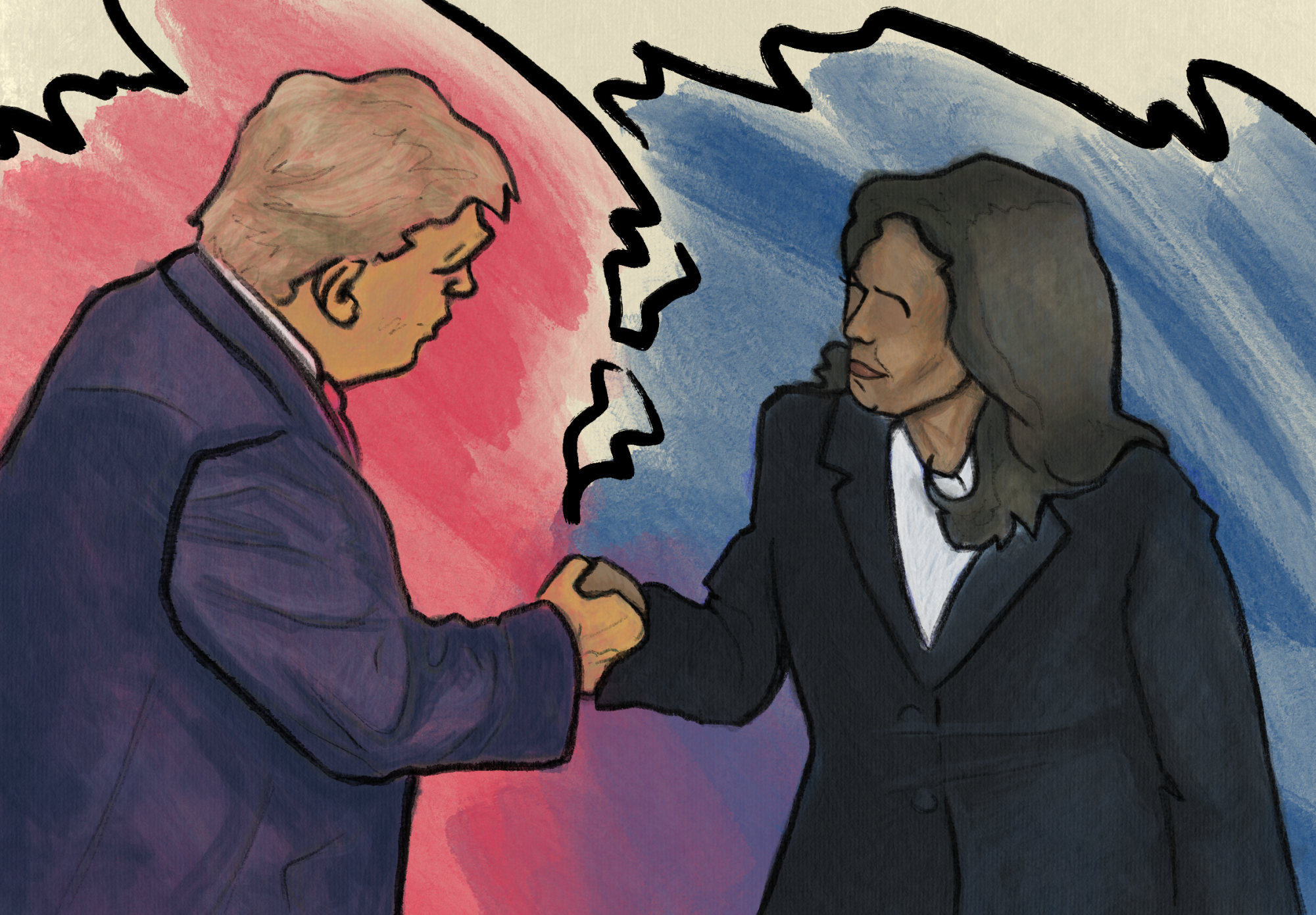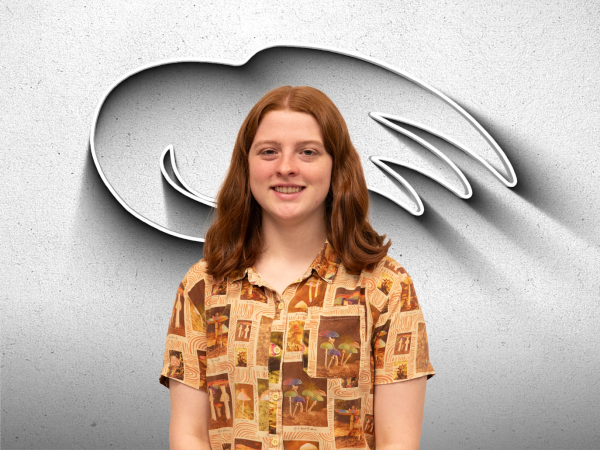No crowd roars; the halls are empty. Silence reigns tangible as former President Donald Trump and Vice President Kamala Harris perform an unsure dance, the former charging towards the podium, the latter making a straight course for the other, arm extended. A shake of hands, and an exchange of a few vague words.
On Sept. 8 at 8 p.m, CST, two candidates walked onto the floor, diametrically opposed in all but the search for the heat of debate.
It is the moment America has been waiting for, suspended with bated breath and framed with the sound of political tiptoeing. The polls are apart by the closest of margins.
For tonight, undecided voters implore of ABC, those with a set mindset sit: arms crossed, in front of their televisions. In the midsts of one of the most polarized social ecosystems of previous years, the event starts with an eventual showing of bipartisanship. The candidates return to their respective podiums.
And thus the debate has begun.
Moderators David Muir and Lindsay Davis represented a cool front for ABC News, delivering relevant questions of policy of the candidates.
While many topics were discussed that evening, one of the most particularly standout points emphasized that evening was the topic of immigration. At several points during the night, Mr. Trump alluded quite deliberately to his immigration policy, and the stance on such he presents to awaiting voters.
In parallel discussion, Vice President Kamala Harris discussed her stance on border security, specifically, citing a bill she worked to have passed by Congress, but failed. “That bill would have put more resources to allow us to prosecute transnational criminal organizations for trafficking in guns, drugs and human beings.” She continued, “But you know what happened to that bill? Donald Trump got on the phone, called up some folks in Congress, and said kill the bill.”
Harris asserted, then, that Trump cared more about the issue to run on in the election, rather than a solution to solve such.
In response, Trump brought up the publicity scare of recent events, “They are eating the dogs in Springfield.” After being corrected on the falsification of this claim, he continued persistently that if we do not create a more secure immigration policy, the United States will become “Venezuela on steroids.” The former president defended this position, and brought it up concurrently with other questions several times, reasserting his points with his ubiquitous phrase, “Make America Great Again.”
Sewn also within the fabric of the debate was the underlying need for a clarification of policy. Specifically, plans aimed at the economy ran under the lining of the discussion.
Harris spoke of an “opportunity economy,” a phrase used quite often within her campaign, and outlined the specifics of her strategy. “My plan is to give a $50,000 tax deduction to start-up small businesses, knowing they are part of the backbone of America’s economy.” After a quick response from Trump on the ambiguity he felt was in her plan, she addressed his previous role in plans, ones that would be discussed to be put into effect if he were elected.
“What you’re going to hear tonight is a detailed and dangerous plan called Project 2025 that the former president intends on implementing if he were elected again,” Harris said. In response, however, Trump refuted his role in the project itself. “Number one, I have nothing to do, as you know and as she knows better than anyone, I have nothing to do with Project 2025. That’s out there. I haven’t read it,” he stated. When drilled afterwards on the expense of tariffs, Trump then said that they would not come from the U.S. but China.
In response to this new information, Harris simply claimed, “So, Donald Trump has no plan for you.” This discussion of policy did not perpetuate much further however, and the candidates instead turned to respective proposals on past discussion, and questions of current standing.
By way of example, one of the most highly contested discussions of the night was the assertions of each candidate in their stance on abortion.
Former President Trump spoke first, attacking the opposing candidate’s stance on abortion, and complimenting himself and the Supreme Court for having the states vote on the overturning Roe V. Wade. “Every legal scholar, every Democrat, every Republican, liberal, conservative, they all wanted this issue to be brought back to the states where the people could vote,” Trump said. “And that’s what happened, happened.” Trump then claimed that those states who did not press for an overturn were “more liberal” than he had expected.
A question was further explored at Kamala Harris’s response: “You want to talk about this is what people wanted? Pregnant women who want to carry a pregnancy to term suffering from a miscarriage, being denied care in an emergency room because the health care providers are afraid they might go to jail and she’s bleeding out in a car in the parking lot? She didn’t want that. Her husband didn’t want that.”
This comment brought a tension to the discussion, an edge that was to be proceeded with an increased caution. In an assertion of stance, a shift, Trump then said, “I’m not in favor of abortion ban. But it doesn’t matter because this issue has now been taken over by the states.”
When then asked to clarify as to how Trump would veto a national abortion ban, he simply said it would not have to happen, instead pivoting to make a stab at the failure of the student loan termination that the Biden administration pushed for.
With heightening emotion, the debate continued a pattern on a search for answers amidst the contradictions of former representation of stances.
From Kamala’s stance on fracking – “I will not ban fracking,” to Trump’s revisitation of his stance on Obamacare- “I have concepts of a plan,” several topics of crucial policy remained in a purgatory.
Several more topics were discussed, including the relationship with foreign leaders, and stance on warfare. However, no clear policy was stated or excavated during those portions of the debate.
Ultimately, at the end of the night, the candidates walked off stage, each concluding statement having been a summary of their insistence on support for themselves, and opposition to the other.
This was the only and final debate of the Kamala-Trump election season, as Trump announced that he would not seek another debate.
Youth and undecided voters have been handed their piece, their dolling of political assertions from either side. With such agency now placed in our hands, democracy exercises its fateful turn.
Regardless of your position this election year, make sure to remained informed, and vote if you are able. The integrity of a debate is only strengthened by the action we take. Polls for the 2024 presidential election open on Nov. 5.
To see a full transcript of the debate, visit https://abcnews.go.com/Politics/harris-trump-presidential-debate-transcript/story?id=113560542″




